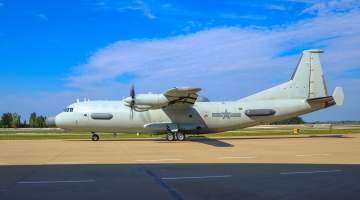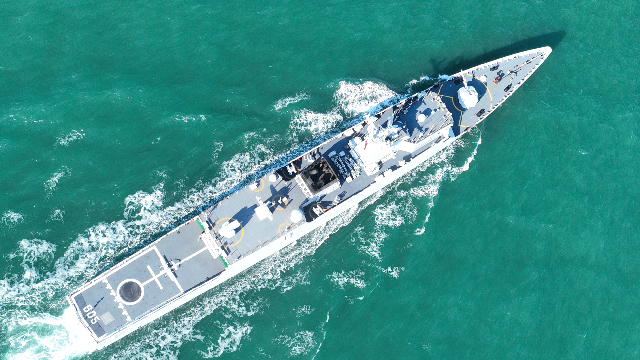By Qin Sheng
The US President Joe Biden, British Prime Minister Rishi Sunak, and Australian Prime Minister Anthony Albanese announced a detailed plan for the trilateral nuclear submarine cooperation at the US naval base in San Diego on March 14. As the first major cooperation project among the three countries since the establishment of the Australia-United Kingdom-United States (AUKUS) trilateral partnership in September 2021, how the US and the UK, as nuclear possessors, help Australia equip its fleet with nuclear submarines has been the concern of the international community. This time, the detailed cooperation plan announced by the three parties means that the project has officially entered the implementation stage. The practice of commissioning and deploying nuclear submarines and developing related nuclear technology in Australia is bound to project extremely adverse impacts on the geopolitical situation in the region and even globally.
First, the practice serves to undermine the strategic balance in the Western Pacific region. Nuclear submarines are strategic weapons with long-range endurance and underwater navigation capabilities that far exceed Australia's goal of defending its national security, while greatly increasing Australia's military projection capabilities throughout the Asia Pacific region. In terms of weapon characteristics, the US' Virginia-class nuclear submarine can launch cruise missiles with a range of 2500 kilometers. When navigating in the northern waters of Australia, its military projection range covers most East Asian countries, including China. Deploying nuclear submarines and equipping them with long-range strike weapons will inevitably trigger an arms race among regional countries and undermine the security and stability of the region.
Secondly, it is to impact the nuclear non-proliferation system in the region. The commission of nuclear submarines to the Royal Australian Navy will make the trajectory of nuclear fuel cover the maritime and continental regions of Southeast Asia and the entire South Pacific region. The two regions have signed the Treaty on Southeast Asia Nuclear Weapon-Free Zone and the South Pacific Nuclear-Free Zone Treaty respectively. Australia's possess of nuclear-powered submarines will inevitably impact the aforementioned treaties, making the nuclear-free zone disappear in all but name. The South Pacific region has had a painful lesson concerning nuclear power in history. During the Cold War, Western countries including the US, the UK, and France, frequently conducted large-scale nuclear tests in the region, and the Marshall Islands are still exposed to the enormous risks of nuclear leakage and pollution to date. The nuclear issue has been one of the most sensitive regional issues for Pacific island countries. In addition, the Association of Southeast Asian Nations (ASEAN) has always hoped that Southeast Asia will not become an arena for major powers' game. The deployment of nuclear submarines to Australia, however, will inevitably exacerbate the competition among major powers, and ASEAN's central position will be further restricted.
Finally, the demonstration effect of Australia will be extremely dangerous to the world as the first non-nuclear country with nuclear submarines. Building nuclear submarines in Australia will inevitably involve the transfer of nuclear technology and nuclear fuel. Currently, there are only six countries with nuclear submarines in the world. Once the practice of the AUKUS is followed by other countries, the risk of nuclear proliferation will increase exponentially. In February 2022, the former Japanese Prime Minister Shinzo Abe stated in an interview that Japan should explore issues related to "nuclear sharing" with the US. In response to such statement that blatantly violated Japan's Three Non-Nuclear Principles and the obligations of Member States of the Nuclear Non-Proliferation Treaty (NPT), Japanese Prime Minister Fumio Kishida stated that the Japanese government would not discuss the issue, while acquiescing to other political parties' different views expressed on the issue, including the Liberal-Democratic Party of Japan (LDP). In January 2023, the ROK President Yoon Suk-yeol pointed out that if the nuclear issue on the Korean Peninsula escalates further, the ROK may deploy tactical nuclear weapons or possess its own nuclear weapons.
In addition to Japan and the ROK, a considerable number of countries around the world have been seeking to acquire nuclear technology and weapons. The dual standards of the US, the UK and Australia on nuclear issues have set a catastrophic precedent and will pose a threat to the nuclear order in the region and even the world.
(The author is an assistant research fellow and Doctor at the Asia Pacific and Global Strategy Research Institute of the Chinese Academy of Social Sciences)
Editor's note: Originally published on China.com.cn, this article is translated from Chinese into English and edited by the China Military Online. The information and opinions in this article do not necessarily reflect the views of eng.chinamil.com.cn.









